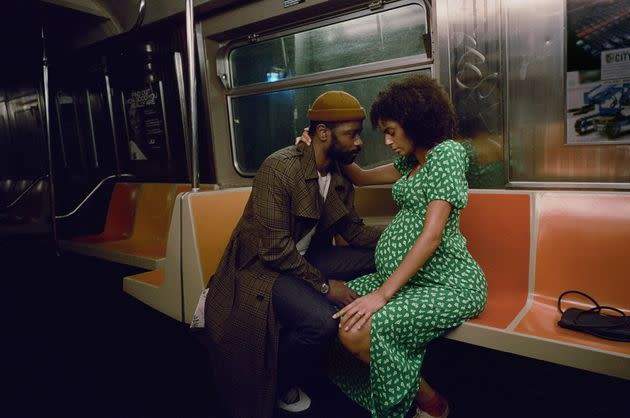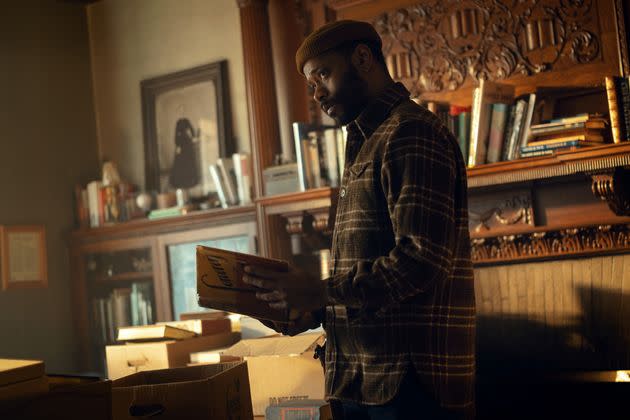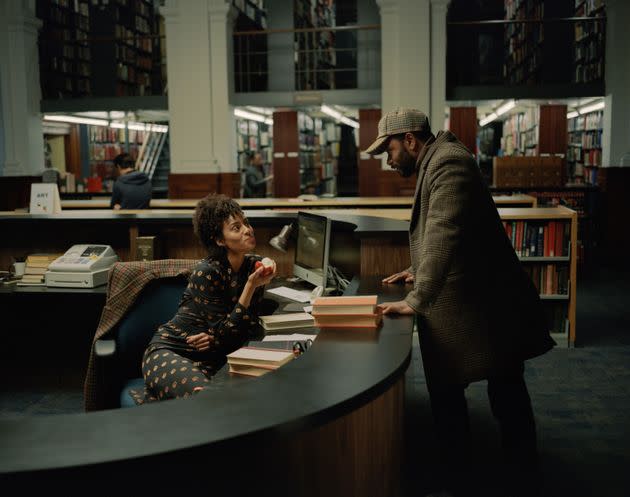Speculative Horror Series 'The Changeling' Challenges You In The Best Way
- Oops!Something went wrong.Please try again later.

Lakeith Stanfield and Clark Backo anchor the fascinating genre series "The Changeling."
You know you’ve landed on something pretty fascinating when almost immediately after finishing it, you gleefully jump down a Google rabbit hole trying to understand more. That’s what it’s like with “The Changeling,” a new Apple TV+ speculative horror series from showrunner Kelly Marcel that’s more like something you experience than something you simply watch.
That’s not exactly a function of the show’s quality, which isn’t easy to determine. It has very high peaks and a few low valleys, and narrative threads that evolve so often and so dramatically, you might begin to wonder whether you’re the one who isn’t up to par.
That is both the exercise and the beauty of “The Changeling,” which is a breathtakingly ambitious undertaking. Based on the 2017 novel of the same name by Victor LaValle, who serves as the narrator and an executive producer of the series, “The Changeling” is an extravagant genre offering about... well, many different things. Most profoundly, it’s about the natural horrors of life and death — as well as the stories we tell ourselves and those we love.
It begins rather sweetly. An antique bookseller in New York named Apollo (Lakeith Stanfield, another executive producer) encounters a love at first sight that shifts his entire world: a librarian named Emma (Clark Backo). She politely declines each time he asks her out on a date, until she finally says yes.
Some time elapses ― time will be a central theme, here ― while Emma has her own life-shifting experience on a monthslong trip to Brazil. When Emma returns to New York and Apollo, we learn in flashbacks that she encountered a woman (maybe a witch) at a lagoon who tied a string around her wrist. If that string falls off, the woman warned, Emma’s three wishes will be granted.
We’re not told what those wishes are, or how they could be ominous ― or why the possibility of having one’s wishes granted at all would be something to fear rather than hope for. “The Changeling” right away seems to bank on that sense of mystery, and has a confidence that viewers will continue to be invested even without having many answers. That’s probably true, because the setup is too spectacular to look away. (Eventually, of course, Emma’s string does become untied, and we watch it tumble to the floor in dramatic slow motion.)
As that moment percolates in your mind, “The Changeling” glides through another layer of its increasingly busy narrative: Bringing us back to the 1970s in New York City, we meet Apollo’s mother, Lillian (Alexis Louder in the younger years, and Adina Porter later), on a date with her future husband, Brian (Jared Abrahamson), who becomes Apollo’s father.
We’re then thrown further back to flashbacks of Lillian’s horrifying experience as a young person in her native East Africa. “The Changeling” uses on-screen text to establish the time and setting of certain sequences, but this one has neither, which is a bit disorienting ― especially because specificity is so critical to each story as it rapidly unfolds.
We also get a glimpse of trauma in Brian’s childhood through flashbacks of his home life in Syracuse, New York. His and Lillian’s stories splinter out to bring us to those of a child Apollo and Emma, and their separate but similarly turbulent early lives that may or may not have brought them together as two young lovebirds when we meet them.
As Emma and Apollo get to know each other in the present day, and Lillian and Brian do so in the past, someone says the same thing in both instances: “One sad story is enough for the first date.” While the audience is privy to each character’s upbringings, their partner doesn’t have those fuller details. And that’s another omission that raises the eyebrow.
It also marks the first significant indication of the connections between these four stories. “The Changeling” is a gargantuan undertaking propelled by gorgeous special effects and world-building, but figuring out the relationships between its knotty and knotted narratives is the crux of the show.
This might sound like a lot of plot detail for a review, and dangerously close to spoiler territory. But none of this is particularly revealing, or even begins to scratch the surface of the actual story. It’s just necessary to understand as you begin to grapple with the series.

Apollo, who calls himself "the god," sinks deeper and deeper into the winding mystery of his wife and son on "The Changeling."
These are also merely fragments of the first episode, directed by Melina Matsoukas (“Insecure,” “Queen & Slim”). But that should give you a sense of the extraordinarily loaded story you’re in for.
Marriage and parenthood are essential demarcations in the story and affect each individual in wildly different ways, which is really when the series comes alive. These moments give way to a sprawling, beguiling narrative that uses fantasy elements like secret realms and emotionally catastrophic events like death, abandonment and violence to illuminate its thesis and challenge the characters and the audience alike.
Truthfully, the emotional Olympics of it all are a lot to handle. There are moments of joy intertwined with agony that fold into a series both arduous and fascinating to watch. We see literal and fantastical images of human ugliness investigated through Apollo, crystallized in Emma’s eyes, and curdled in Lillian’s narrative.
This world has gods, angels and monsters drifting through the story, and “The Changeling” leaves much of it up to you to decide who’s which and at what point. (Apollo constantly claims to be a god, but the series doesn’t seem fully interested in exploring how or why that is, which is frustrating.)
Greek mythology (because that’s in this series, too) describes Apollo as the god of prophecy and healing, one who can ward off evil yet bring on ill health. Here, Stanfield’s Apollo is our protagonist, a loving Black father and husband desperate to put the pieces of his life back together after devastation, and hoping to understand past traumas that begin to materialize in shocking ways.
We follow his horrific odyssey, one colored by broken and mangled faith, distortion of truth in each character’s story — perhaps to protect others, or themselves? — and even the psychologically delicate nature of motherhood.

On "The Changeling," everything you see is potentially connected, and the series doesn't make it easy to put all the pieces together.
All of this fills the romantic dates early in the series with even more meaning, and helps simplify this otherwise challenging story. Getting to the end of “The Changeling,” though, requires acute attention to detail and maybe even a degree of mental aerobics that some viewers may decide isn’t for them.
The show neither holds your hand nor equips you with all the answers, which creates further chaos. It’s far from “background TV” that you can put on while doing laundry or any other menial task. This is a series that assumes your undivided attention.
It also inspires curiosity, something refreshing in today’s culture of quick reactions and woefully little thought. Some people might be led down a Google search into an exploration of Greek mythology. Others might want to learn more about LaValle’s inspirations for the story.
LaValle, a Black father raised by a single Black mother, told the Los Angeles Times in 2017 that while he was conscious about making Apollo too like himself, he knew there were similarities. At one point, he says, “He needs to be a great guy, and that’s who I am, too, so there’s a danger that I’m going to be patting myself on the back a little bit too hard as Apollo.”
Emma, meanwhile, is also a deeply complex and fascinating character as brought to life by Backo, who holds her own against Stanfield in just as difficult a role. Postpartum depression is one way to interpret what goes on in Emma’s trajectory, which gives her character additional texture and encourages the audience to view her with a sense of inquisitiveness — as with all other parts of this story that engage with real-world issues. (In an interview with The New York Times earlier this year, LaValle mentioned Jamaica Kincaid’s “The Autobiography of My Mother,” which he said had a huge impact on him.)
This series, as with any great genre offering, confronts the harrowing and the beautiful in equal measure. Quiet when it needs to be and utterly mind-bending occasionally ― sometimes to a fault ― “The Changeling” doesn’t bother with a happy ending, or indeed an ending at all. It pursues the truth, as jagged and frightening as that might be.
Visionary in so many ways, it deserves extra props for not going down easily.
